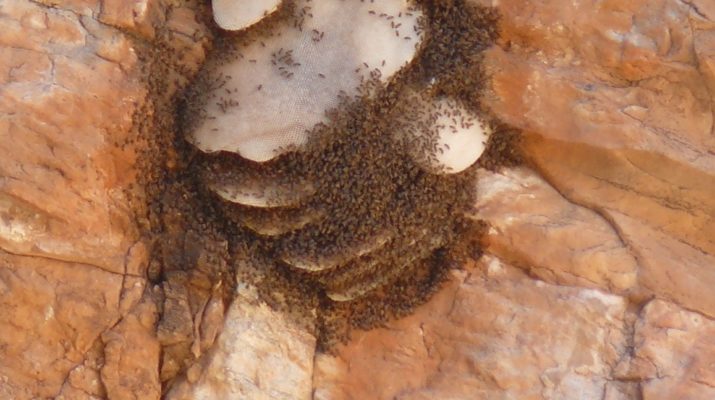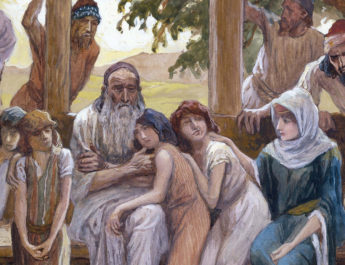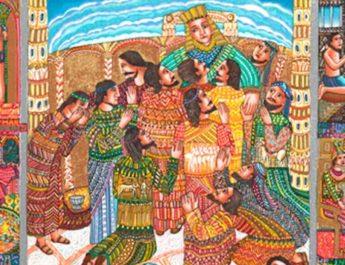Psalm 81:1, 10-16
Ordinary C40
To the leader:A according to The Gittith.B Of Asaph.C
A “leader” = natsach. Properly, something that glitters from a distance. So, something that stands out, excels, has status/standing (such as a chief musician or superintendent of Temple services). This can also mean to be permanent or enduring.
B “Gittith” = Gittith. 3x in OT– all psalms. From gitti (someone from Gath); from Gath (Philistine city called Gath, meaning “wine press”); from the same as gath (wine press); from nagan (to play a stringed instrument, song, melody, make music). This is Gittith – some kind of musical notation, perhaps referring to a harp from Gath.
C “Asaph” = Asaph. From asaph (to gather, assemble, bring, take away, destroy, or remove). This is Asaph, meaning “gatherer” or “collector.” It is a personal name.
1 Sing aloudD to GodE our strength;F
shout for joyG to the God of Jacob.H
D “sing aloud” = ranan. This is a cry of joy or a joyful song. Properly, it is emitting a shrill sound, especially one of joy.
E “God” = Elohim.
F “strength” = oz. From azaz (to be strong, become fixed, be bold, prevail, be impudent; it means to be stout literally or figuratively. A Late Hebrew word). This is strength in the sense of force, majesty, praise, material and physical strength, the abstract notion of security. It can also speak of social or political power.
G “shout for joy” = rua. To break or destroy something so figuratively, an ear splitting sound such as a call of alarm or a joyful sound.
H “Jacob” = Yaaqob. From the same as aqeb (heel, hind part, hoof, rear guard of an army, one who lies in wait, usurper). This is Isaac’s son and his descendants. The name means heel-catcher or supplanter.
10 I am the LordI your God,
who brought you upJ out of the landK of Egypt.L
I “Lord” = YHVH. From havah (to be, become) or hayah (to come to pass, become, be). This is the name of the God of Israel, the self-existent and eternal one, the tetragrammaton. This pronunciation has been lost to time so “Lord” is generally used in its place.
J “brought…up” = alah. This is to go up, approach, ascend, be high, be a priority; to arise in a literal or figurative sense.
K “land” = erets. Root may mean to be firm. This is earth, ground, field land, or country.
L “Egypt” = Mitsrayim. Perhaps from matsor (besieged or fortified place, bulwark, entrenchment; something hemmed in; a siege or distress or fastness); from tsur (to confine, besiege, to cramp). This is Egypt.
Open your mouthM wide,N and I will fillO it.
M “mouth” = peh. This is mouth in a literal or figurative sense. So, more literally, it can be beak or jaws. More figuratively, it refers to speech, commands, or promises.
N “open…wide” = rachab. This is to grow wide or enlarge in a literal or figurative sense. It can also mean extend, relieve, rejoice, or speak boldly. This is the verb that Rahab comes from.
O “fill” = male. This is fill, satisfy, replenish, accomplish, fulfill, confirm, or consecrate. It is fill in a literal or figurative sense.
11 “But my peopleP did not listenQ to my voice;R
IsraelS would not submitT to me.
P “people” = am. From amam (to darken, hide, associate; creating shadows by huddling together). This is people or nation. It can be used specifically for a tribe, collectively of troops or armies, or figuratively to refer to a flock of animals.
Q “listen” = shama. This is to hear, call, consent, or consider. It implies listening intelligently, giving attention, and, because of these two factors, obedience and action are often implied.
R “voice” = qol. This is a sound, used often for human voices. Also used when God speaks or angels, animals or instruments. It can be a cry or a noise, thunder or earthquakes and so on.
S “Israel” = Yisrael. Related to “God” in v1. From sarah (to persist, exert oneself, contend, persevere, wrestle, prevail) + el (see note E above). This is Israel, meaning God strives or one who strives with God; new name for Jacob and for his offspring. This refers to the people and to the land.
T “submit” = abah. This is to breathe after, be willing, obey, accept, be content with, satisfy.
12 So I gave them overU to their stubbornV hearts,W
U “gave…over” = shalach. This is to send out, away, send for, forsake. It can also mean to divorce or set a slave free.
V “stubborn” = sheriruth. 10x in OT. From the same as shor (body, umbilical cord, core of strength); from sharar (enemy or watcher); see shorer (foe, a treacherous watcher); from shur (to behold, see, watch, perceive; to spy out, lie in wait, lurk for; can also be to care for). This is stubbornness or lust.
W “hearts” = leb. May be related to labab (to encourage; properly, to be encased as with fat; used in a good sense, this means to transport someone with love; used in a bad sense, it can mean to dull one’s senses). This is the heart, courage, one’s inner self, the mind, or the will. Heart is only used in a figurative sense in the Old and New Testaments.
to followX their own counsels.Y
13 O that my people would listen to me,
that Israel would walkZ in my ways!AA
X “follow” = halak. This is go, come, walk. It is walk literally and figuratively and includes people and animals. It can be used figuratively for one’s moral life – how we walk according to God’s way or against it. It can also refer to the walk of life as in the course one’s life takes, the choices we make, etc.
Y “counsels” = moetsah. 7x in OT. From yaats (to counsel, advise, determine). This is counsel, plan, purpose, or device.
Z “walk” = halak. Same as “follow” in v12. See note X above.
AA “ways” = derek. From darak (to tread, march, to walk. Can also mean affixing a string to a box since one needs to step on it to bend it in the process; so also an archer). This is a road as a thing that is walked on. Can be used figuratively for the path that one’s life takes or how one chooses to live one’s life.
14 Then I would quicklyBB subdueCC their enemiesDD
and turnEE my handFF against their foes.GG
BB “quickly” = me’at. From ma’at (being or becoming small, decrease, diminish, pare off). This is a little or few, lightly little while, very small matter.
CC “subdue” = kana. This is to be humble, subdue, humiliate, conquer. Properly, it means to bend the knee.
DD “enemies” = oyeb. From ayab (to hate or be hostile to). This is a foe or enemy as one that you are hostile to.
EE “turn” = shub. To turn back, return, turn away – literally or figuratively. Doesn’t necessarily imply going back to where you started from. This is also the root verb for the Hebrew word for repentance “teshubah.”
FF “hand” = yad. This is hand, ability, power. Hand in a literal sense, but also what one can do or the means by which one does it.
GG “foes” = tsar. From tsarar (to bind, restrict, narrow, be cramped, an adversary). Properly, this is a narrow or constricted place. Figuratively, it can be trouble, a pebble, an enemy, anguish, or distress.
15 Those who hateHH the Lord would cringeII before him,
and their doomJJ would lastKK forever.LL
HH “hate” = sane. This is to hate, an enemy. It is a personal hatred and not an abstract one.
II “cringe” = kachash. This is deceive, fail, or deny. It can be lying or disappointing. It can also mean becoming lean or cringe.
JJ “doom” = eth. Probably from anah (to answer, sing, announce); from ad (forever, all, old); from adah (to pass on, advance, decorate oneself). This is a period or season. It can also mean whenever or continually.
KK “last” = hayah. Related to “Lord” in v10. See note I above.
LL “forever” = olam. This is a long scope of time whether in the past (antiquity, ancient time) or in the future (eternal, everlasting).
16 I would feedMM you with the finestNN of the wheat,OO
and with honeyPP from the rockQQ I would satisfyRR you.”
MM “feed” = akal. This is to eat, devour, burn up, or otherwise consume. It can be eating in a literal or figurative sense.
NN “finest” = cheleb. This is fat, finest, marrow. It is fat in a literal or figurative sense. It refers to the richest or best part.
OO “wheat” = chittah. Perhaps from chanat (to spice, ripen, embalm). This is wheat, referring to the plant or its product.
PP “honey” = debash. Root may mean being gummy. This is honey or honeycomb because it is so sticky. It can also refer to syrup.
QQ “rock” = tsur. Related to “Egypt” in v10. From tsur (see note L above). This is rock, stone, cliff, boulder, rocky. It can also be a refuge, a way to refer to God.
RR “satisfy” = saba. To be satisfied or full in a literal or figurative sense. Also, to have plenty of.
Image credit: “0710 Beehive high in the Cliffs above Agua Caliente Canyon” by Charles Miles, 2007.




